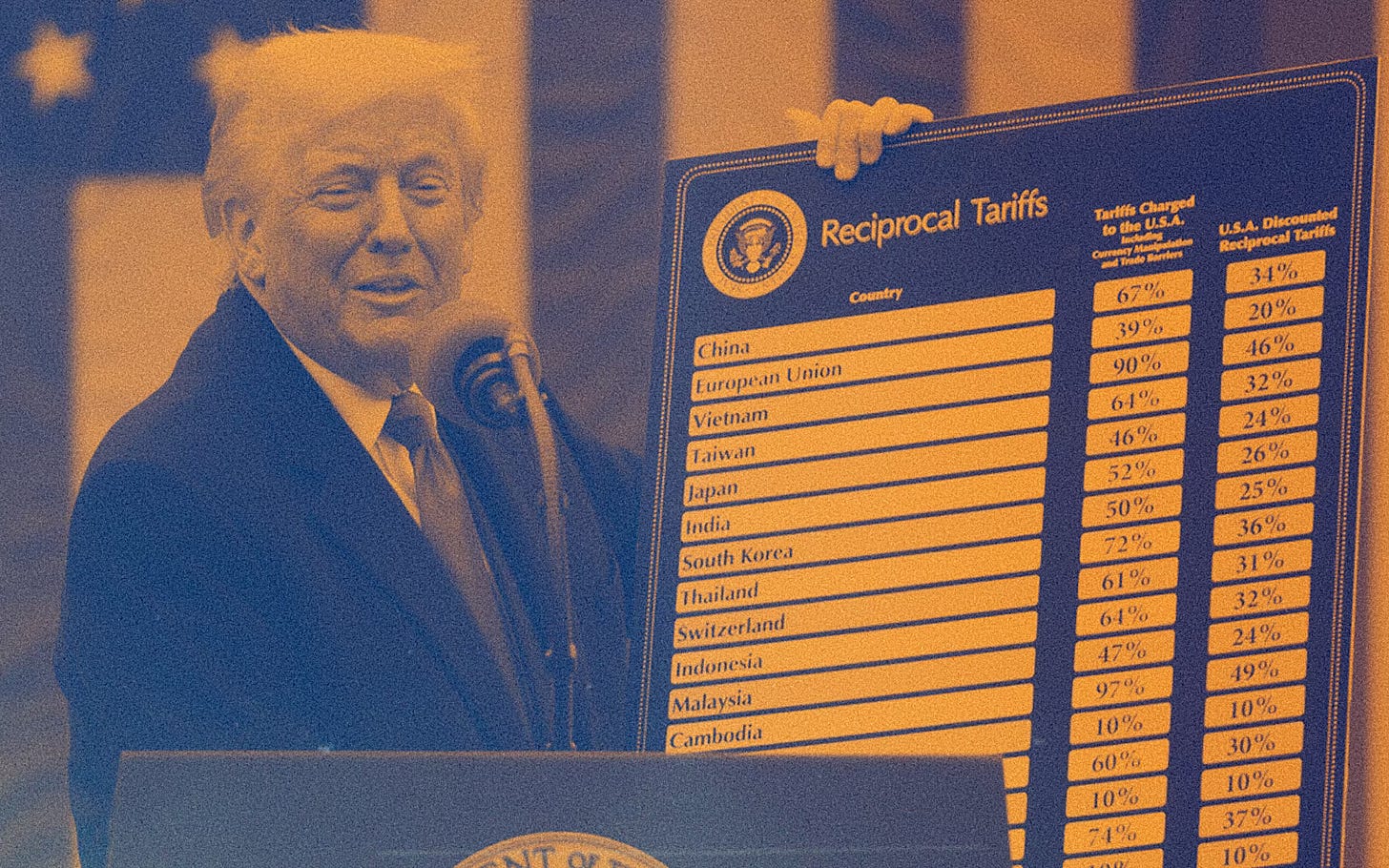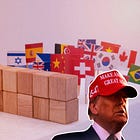This Administration's Mercurial Trade Policy Injures Our Economy and Our Democracy
Congress needs to take back the powers it has ceded to prevent presidents from starting trade wars

America, a country founded in defiance of arbitrary economic control, is now imposing it on its own people and its allies.
Before suddenly announcing a 90-day tariff pause hours ago, in a Rose Garden announcement last Wednesday President Trump proudly displayed his “Reciprocal Tariffs” chart, imposing a baseline 10% tariff on imports from every country—allies and adversaries alike—with rates ranging up to 50%. To make this happen, Trump invoked the International Emergency Economic Powers Act, declaring a “national economic emergency.”
This new tariff regime would have—and still might if tariffs return at the end of three months—hit almost every imaginable product, from electronics and machinery to apparel and agriculture, sparing only a few strategic imports like certain metals, semiconductors, and energy resources. The president claims these “reciprocal tariffs” will counter foreign protectionism and fix “unfair” trade deficits that have “hollowed out” U.S. manufacturing. In reality, the tariffs were set by a crude formula tied to bilateral trade gaps, not actual tariffs being imposed by foreign countries—math that one analyst called “nonsensical … with zero relationship to real policies.”
As an economist, I feel professionally obligated to point out that there is nothing inherently bad about trade deficits. Americans run deficits with some countries and surpluses with others as a natural result of consumer choice and comparative advantage, not because of nefarious foreign barriers.
Again, as an economist, I care a great deal about trade—not as an abstraction, but as a mechanism of opportunity. Since the end of World War II, freer trade has catalyzed the greatest reduction of poverty in human history. In America and around the globe, wherever leaders have embraced markets, economic liberalization has raised life expectancy, lowered infant mortality, and created pathways to prosperity. No economic policy in the modern era has done more to improve the condition of humanity than the deliberate opening of markets, not through conquest, but through peaceful cooperation and voluntary exchange.
That’s why I’m baffled by the idea that tariffs are a pathway to renewal. The immediate economic fallout of last week’s tariff spree was alarming. The Dow Jones Industrial Average dropped over 2,000 points in two days after Trump’s Rose Garden announcement. About $5 trillion evaporated in a blink of an eye.
None of this was surprising. It’s what every B+ student in an international trade course would have predicted. When you tax a value-creating activity—like trade born of comparative advantage—you will see less of it. That’s why investors were fleeing.
It’s true that markets are breathing a sigh of relief, surging back to their pre-“Liberation Day” levels within hours of the announced 90-day pause. But what comes next could be worse if the administration inflicts further rounds on-again/off-again trade restrictions. Not only will American consumers bear the costs of higher prices on countless everyday goods if the president’s tariffs are reinstated, but the policy swings themselves are destructive. As I argued in a recent Persuasion article, the arbitrariness of the administration’s actions is generating deep uncertainty that will have investors unwilling to make big, long-term bets on the American economy until something like normality returns.
But as worried as I am about the economic impact of a global trade war and policy-driven uncertainty, I’m even more concerned about what this means for our constitutional democracy. The president’s tariff regime isn’t just economically harmful—it reverses the moral and political logic that made trade a foundation of the American experiment.
In direct contrast to monopolistic controls of Old World mercantilism, Founding-era thinkers saw the free movement of goods, services, and people across borders as a vital expression of liberty and American sovereignty.
That belief is woven into the Declaration of Independence itself. It enumerates 27 grievances against the Crown, many of them aimed at arbitrary economic power and executive overreach. Among the “long train of abuses and usurpations” were the imposition of taxes “without our Consent,” and the King’s manipulation of crises to consolidate power. Most strikingly, the authors of American independence decried the King and Parliament (in which they had no representation) for “cutting off our Trade with all parts of the world.”
Likewise, in Federalist No. 47, James Madison warned that “the accumulation of all powers, legislative, executive, and judiciary, in the same hands … may justly be pronounced the very definition of tyranny.” The Founders were not only concerned with monarchy in name—they feared monarchy in function. At the Constitutional Convention, some worried that the presidency would become “the foetus of monarchy.” That’s why the Constitution sought to guard against precisely this kind of concentration of power. It vests the authority to “regulate commerce with foreign nations” in Congress, not the executive.
President Trump’s use of emergency powers to impose tariffs bypasses that structure entirely. And it not only violates the Constitution—it also breaks the statutory law being invoked. The Emergency Economic Powers Act, enacted in 1977, is constitutionally problematic in its delegation of power to the president, but even on its own terms, it requires a genuine “unusual and extraordinary threat” before the president can wield unilateral power over commerce with foreign nations. Despite Trump’s claims to the contrary, America is experiencing no such threat. Indeed, the very fact that the president has hit the pause button now shows that there never was any national emergency to justify the tariffs in the first place.
This isn’t just a policy debate: it’s a break from our constitutional law and the basics of the American tradition. The Founders understood that liberty requires lawful process, and that the power to tax or restrict trade must never rest in the hands of a single individual. When a president can trigger a trade war with Canada, Mexico, or the European Union—without a vote, without a hearing, without even a rational basis for the rates imposed—it’s not merely a trade problem. It’s a crisis of consent.
In his revolutionary pamphlet Common Sense, Thomas Paine presented a vision of a republic that would engage the world through free exchange rather than imperial encroachment. “Our plan is commerce,” he wrote, “and that, well attended to, will secure us the peace and friendship of all Europe.” For Paine, trade was a force for peace, not conquest. It was the economic expression of republican virtue.
That vision has faded from memory. If we truly want to lead the free world, we must again act like a free people governed by the rule of law, not proclamation. That means restoring Congress to its constitutional role in trade policy. It means rejecting the false promise of protectionism-by-fiat. And it means remembering what the authors of the American republic understood: liberty and the freedom to trade are inseparable, and the prosperity they bring are among freedom’s greatest gifts.
Congress should take back its prerogative now and prevent this or any future president from overstepping their authority and inflicting economic hardship on their own people.
This essay was originally published in Persuasion.
Follow us on Bluesky, Threads, YouTube, TikTok, Facebook, Instagram, and X.
We welcome your reactions and replies. Please adhere to our comments policy.







Excellent piece. If only members of Congress could read.
Trump: I know, let’s make the world suffer because of my surface (mis)-understanding of economics. The man only knows he can stiff employees by declaring bankruptcy … so why not everyone else?